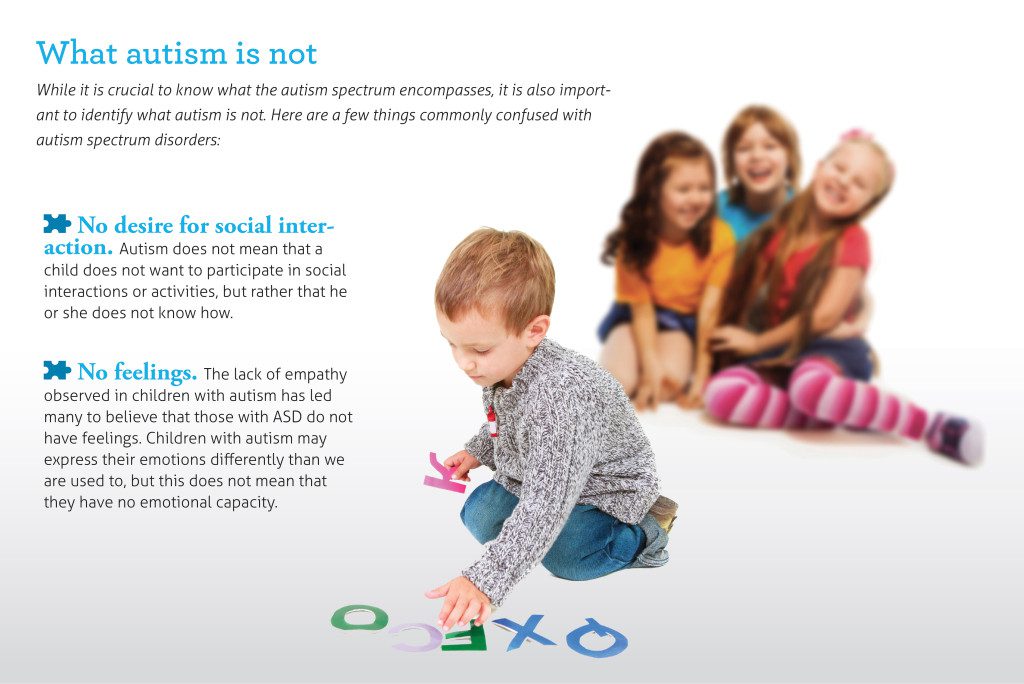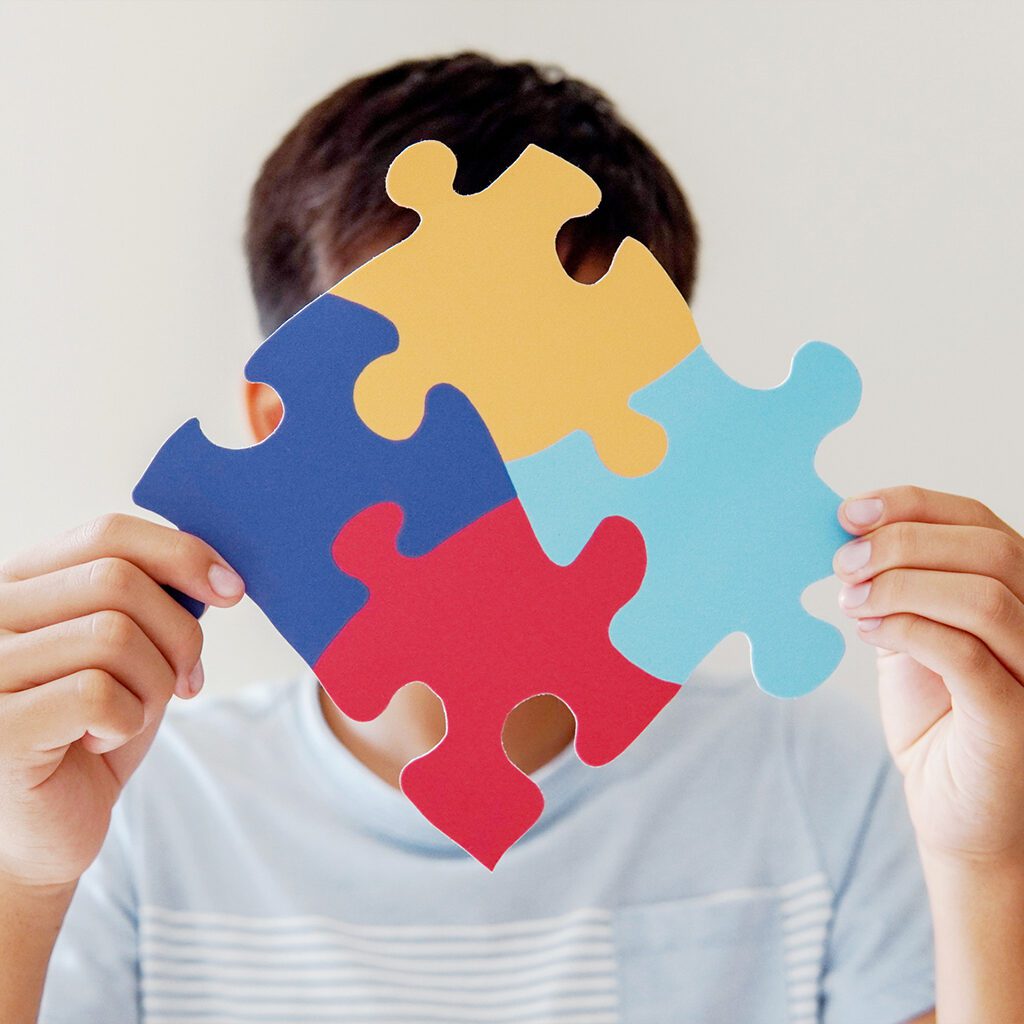Understanding what it is—and what it’s not
There is a great deal of confusion surrounding the word “autism.” In today’s world, describing someone as “autistic” or as “having autism” could mean a number of different things. Some people use it to refer to a person with a mild social impairment, while others may use it to describe a child with the inability to communicate. But what is autism, really? And are we using the word appropriately? A true understanding of the condition begins with getting our definitions correct.
Full PDF here.

What is autism?
In the most recent edition of the American Psychiatric Association’s Diagnostic and Statistical Manual of Mental Disorders, all autism disorders are placed under the umbrella term “autism spectrum disorder” (ASD). This reflects the belief held by many mental health professionals that individuals with ASD are best represented as a single diagnostic category with differentiations between severity of symptoms and associated features.
Autism spectrum disorder (ASD) encompasses a broad range of disorders of early brain development characterized by difficulty in social interaction, trouble with communication, and restricted, repetitive patterns of behavior.
Children with ASD do not follow typical developmental milestone patterns and frequently have difficulty with emotional and sensory regulation. However, given the wide range of symptoms contained in ASD, each individual case is unique. Some children with ASD may have intellectual disabilities, difficulty with fine motor skills, or even physical problems like sleep disturbances or gastrointestinal issues. However, despite deficits in any or all of these categories, some children with ASD excel in specific areas like music or academics.
Autism spectrum disorder affects all socioeconomic, ethnic, and age groups, though males are four times as likely to have ASD as females. Current research shows that ASD affects one in 88 children and one in 54 boys. Researchers still remain unsure of the cause of autism, although it appears to be rooted in very early brain development and seems to have strong genetic links.
Does my child have autism?
Because of the wide variations in symptoms and severity, ASD may be overlooked by those who are not familiar with autism spectrum disorder. Simply put, diagnosing autism is challenging.
The developmental disabilities associated with ASD typically occur before age three. Therefore, it’s important for parents and caregivers to be familiar with the signs of autism and with age-appropriate developmental milestones that their child should be reaching. Studies show that early behavioral intervention in young children with ASD significantly improves learning, social, and communication skills. As far as diagnosis is concerned, the earlier the better. Here are some common symptoms of ASD:
Social Interaction Impairment:
Rarely smiles when approached, fails to imitate other’s expressions, lack of response to name, little or no eye contact, lack of interest in peer engagement, preference for playing alone, seems to be in a “world of their own.”


Communication Impairment:
Delayed development of speech, limited use of gestures, lack of back and forth engagement in conversation, unusual tone of voice, scripted speech or echolalia (repeating words spoken by another person), lack of “W” questions, literal understanding, misreads body language, difficulty taking another point of view, self-directed speech, uses “own language.”
Restrictive Interests and Repetitive Habits and Behaviors:
Preoccupation with certain objects or topics, “stereotyped” body movements
- Stiffening
- Hand Flapping
- Body Posturing
- Moving in a Pattern
Restrictive Play
- Lines up objects
- Plays the same way with the same toy
Restrictive Eating Patterns
- Strong preferences in types of food eaten
- Texture
- Presentation
Sensory impairments
- Difficulty processing everyday sights
- Sounds
- Tastes
- Smells
Emotional Regulation Impairment:
Inflexible adherence to specific routines or rituals, emotional outbursts over change of objects in their environment or play, frequent prolonged meltdowns that are difficult to console, aggression towards self or others.
I think my child might be autistic. What do I do now?
The process of diagnosing autism begins with identifying the symptoms discussed above, whether by parents in the home, a caregiver, or a teacher. If symptoms point to ASD, it is extremely important to see a health care professional for additional testing.
“By 18-24 months, a toddler should be evaluated by a primary care physician with a specific ASD screener if skill deficits are detected or if the child is at risk—for example, if he or she has a sibling with ASD, or a caregiver or teacher is particularly concerned,” says Dr. Regina Gargus, director of the Siskin Center for Developmental Pediatrics at Siskin Children’s Institute.
If an initial screening determines the need for further evaluation, a child will undergo a second stage of diagnosis to determine whether other conditions may be responsible for his or her symptoms. “At that point, the child should be referred for a comprehensive developmental-ASD evaluation, as well as an audiology assessment and a speech therapy evaluation,” says Dr. Gargus.
The ADOS(autism diagnostic observation scale) is considered the “gold standard” evaluation to confirm symptoms of ASD. A team of specially trained psychologists, neurologists, psychiatrists, and speech therapists will assess various aspects of development that signal ASD.


Did You Know?
April is National Autism Awareness Month. Find out how you can get involved in autism awareness events this month by visiting at chattanoogaautismcenter.org and clicking “Events.”
A diagnosis of ASD is not hopeless. In fact, it may bring relief to those who have long struggled with symptoms of autism without understanding the cause. Giving a name to the challenge can make it easier to face.
How is it treated?
While there is no medical cure for ASD, research shows that behavioral therapies and interventions can provide substantial improvement, especially if the child is relatively young.
Experts generally recommend a holistic treatment approach. A trained professional can work with you and your child to develop a “plan of action” tailored specifically to your child’s needs. “Treatment may include psychotherapy, behavior modification therapy, social skills training, education interventions, diet modification, medication, and cognitive skills training,” says Michelle Hecker Davis, executive director of Learning Rx.
For example, a child may see a therapist to work on language and social skills, while at the same time, a parent receives counseling regarding the specific challenges of living with a person with ASD.
Cognitive therapy, while not a “cure” for autism spectrum disorders, can significantly alter patients’ quality of life, Davis says. “Intense one-on-one cognitive skills training can help people with ASD move much closer to recovery where the effects of the disorder may be hardly noticeable. The therapy strengthens weak mental skills, leading to a faster, more efficient learner who’s more socially adept, happier, and more confident.”
Physicians may also prescribe medications to treat conditions related to autism, like depression, anxiety, ADHD, and obsessive-compulsive disorder.
“There are two medications approved for improving irritability in children with autism: Risperdal and Abilify,” says Dr. Ken Pittman of Agape Youth Behavioral Health and Parkridge Valley Hospital. “Stimulant medications—the family of Ritalin and Adderall—can sometimes help with ADHD-like symptoms in autism. Medicines like Tenex, Intuniv, and Clonidine can help with impulsivity and on occasion can help with aggression. SSRIs like Prozac and Zoloft can occasionally help with depression and anxiety symptoms in children with autism.”
Interested in learning more?
The East Tennessee Chapter of the Autism Society (ASA-ETC) provides support, services, advocacy, and public awareness for all individuals with Autism Spectrum Disorders (ASD) and their families as well as educators and other professionals. ASA-ETC was incorporated as a nonprofit in 1989 and serves 36 East Tennessee counties including Bradley, Bledsoe, Hamilton, Marion, McMinn, Meigs, Polk, Rhea, and Sequatchie. Visit online today at asaetc.org.


Regina Gargus, M.D.
Director, Siskin Center for Developmental Pediatrics at Siskin Children's Institute


Michelle Hecker Davis
Executive Director, Learning Rx


Ken Pittman, M.D.
Child & Adolescent Psychiatrist, Agape Youth Behavioral Health, Parkridge Valley Hospital

